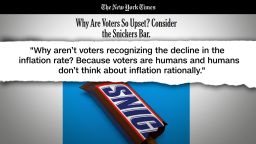The reviews are in on the new UK government’s plan to slash taxes and load up on debt, and they are, um, far from glowing.
Here’s the deal: The British pound tumbled to a record low against the US dollar on Monday as investors around the world dumped UK assets.
For the first time in history, the pound is on track to hit parity with the dollar before the end of the year. At its low point Monday, the British currency traded at $1.03 before stabilizing around $1.07. (For context, the pound has fallen from $1.34 at the start of the year.)
Part of the pressure on the pound comes from the strong dollar, which has gotten a boost from the Federal Reserve’s interest rate hikes. (The dollar tends to strengthen in uncertain times, when investors are hungry for a place to park their money while riding economic shocks, like a pandemic. Or a war. Or inflation. Or all of the above, all at once.)
But the pound is also falling against the euro, signaling broader concerns about the UK’s financial health. Let’s dig a little deeper on that:
- Right now, the UK is looking less like a safe haven for investors because the British government is making a huge, frankly head-scratching wager on tax cuts that turns years of fiscal policy on its head.
- To be clear, almost no one outside of the administration of Liz Truss, who replaced Boris Johnson as prime minister less than a month ago, agrees with her unorthodox, trickle-down-esque approach, known colloquially as Trussonomics.
- The Truss economic theory goes that cutting taxes will help jump-start a stagnant economy and take the edge off any looming recession.
- But, as critics of her plan have long noted, the policy will force the government to borrow heavily to pay for both the tax cuts and a state-run program to cap payments on consumers’ eye-watering energy bills that have plunged the country into a cost-of-living crisis.
- Under the plan, all British households will see their income tax rates fall, and have their energy bills capped at an average of about $2,700 a year. But, as my colleague Anna Cooban writes, it will be the richest people who benefit most.
- Critically, the growth-focused goal of Trussonomics is fundamentally at odds with the inflation-fighting mission of the Bank of England.
- Key quote: “Serious questions are already being asked about the economic competency of the new government,” said Craig Erlam, senior market analyst at Oanda.
As the pound nose-dived Monday, pressure rose on the Bank of England to intervene with an emergency rate hike to try to shore up confidence in the pound. While the bank did issue a statement saying it was watching the situation closely, it stopped short of an emergency hike.
The pound’s decline is a far bigger problem than just the significant headaches its causing among currency and bond traders.
Britons are already struggling to pay for food and fuel as inflation hovers around 10%, and a weaker pound will only make those essentials more expensive.
“This is a painful reminder that economic policy is not a game,” said Torsten Bell, chief executive of the Resolution Foundation, a think tank that focuses on boosting living standards for low- to middle-income households.
Read more:
- The pound’s crash will make inflation worse and push interest rates higher.
- The rich are the biggest winners of Britain’s tax-cutting gamble
- US stocks fell yet again as currency market turmoil rattles investors
QUOTE OF THE DAY
“When you’re younger, you can go out and get two or three jobs, you can hustle … But when you’re a senior, it’s tough to pivot.”
This is how Catherine Powell, a lifelong Clevelander, found herself back in the workforce at the age of 62, taking a part-time job helping other seniors apply for benefits such as the Supplemental Nutrition Assistance Program.
The Fed has warned about “pain” to come with rising interest rates, but seniors and others on fixed incomes are already living it, my colleague Martha C. White reports.
EVERYTHING BUT BLING
How about some slightly cheerier news, eh mates? For that I turned to my colleague Parija Kavilanz, who reported today that we the people may finally get some price cuts just in time for the holidays.
Long story short: Remember how pandemic-induced supply chain problems left store shelves empty and forced you to wait, like, almost a year for that new stove to arrive? Well, fast forward to now, those supply chains aren’t fully recovered but stores are now overloaded with crap they can’t sell because they assumed we’d all keep shopping out our anxieties like it was 2020 (inflation had other ideas).
That means the holidays are going to be all about deals. And sales are starting earlier than ever. Amazon just announced a second Prime Day event for mid-October; Target and Walmart are also kicking off holiday sales next month.
But there is at least one big, sparkling exception to the sales bonanza. The bling, baby.
Holiday jewelry sales have been on fire for the past two years, Parija writes, and that puts the entire category in good shape, even with the sting of inflation. Jewelry is seen as a good investment, so people may opt for a quality over quantity approach to gift buying this year.
It also helps that there’s not, like, a must-have new phone or gaming console or trendy stationary bike competing to be the Big Gift.
Bottom line: Jewelry is always a winner for Christmas, in case anyone I live with is in need of ideas…



























